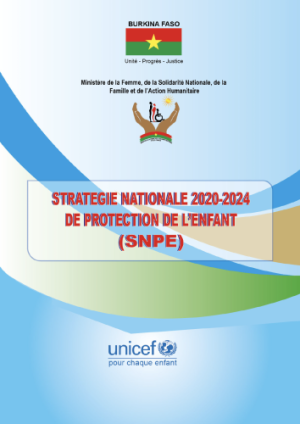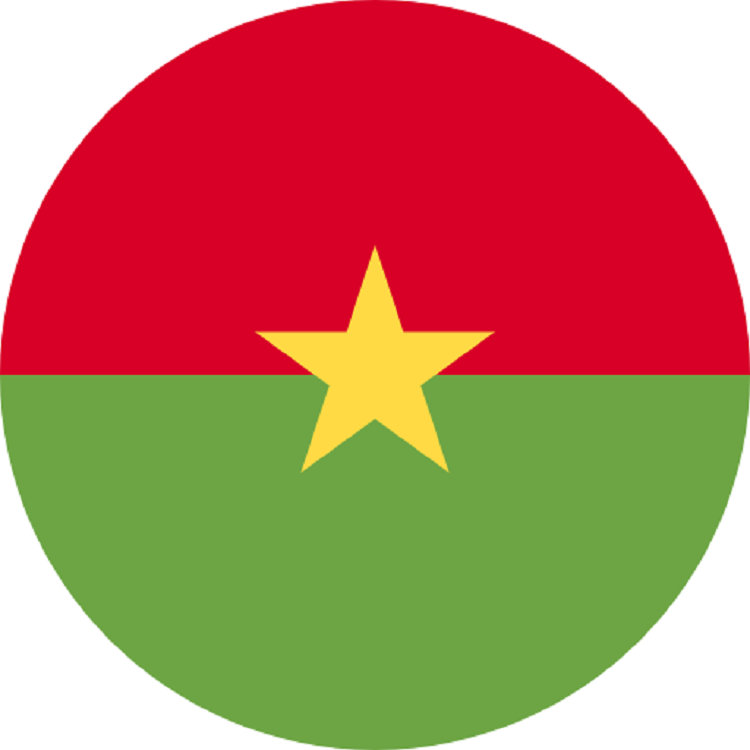 National Strategy to End Violence Against Children 2020-2024
National Strategy to End Violence Against Children 2020-2024
Burkina Faso

2005
2007
2008
2010
2013
2018
2019
2020
The 2020-2022 Three-year Action Plan is the main tool for planning the actions of all stakeholders in the child protection system, including children's organizations like the Parliament of Children and related clubs. The semi-annual and annual reviews of the action plan (and the sessions of the National Council for Children) are held to solidify frameworks for the actors in child protection. The Child Protection Working Group, which brings together the main actors involved in the fight against violence against children, also holds monthly sessions. In addition, child protection networks established in all provinces promote the interoperability of actors through case conferences.
The government implements activities to promote and protect children's rights in collaboration with non-governmental organizations and civil society organizations. For example, the government has signed agreements with the Republic of Côte-d'Ivoire in 2013, and a tripartite agreement with Togo and Benin in 2019, to fight against the cross-border trafficking of children.
The children's parliament, which was established in 1998, allows children to express their opinions on the national level. Children's parliament bodies have been set up in the 13 regions and 45 provinces of the country, and participate as statutory members in consultation frameworks at regional and provincial levels.
Several actions are strengthening the statistical system relating to children, including:
- The creation of the General Directorates of Studies and Sectoral Statistics (DGESS) which allow the regular production of statistical directories and dashboards of the various ministries.
- The establishment of a childhood register in social services.
- The general census of disabled children (RGEH) in 2013.
- The census of street children and young people (EJSR) in 2016.
- The deployment in 2018 of a digital platform for collecting data on child victims of violence called the Child Protection information management System (CPIMS +).
- The integration of the "Washington Group" questionnaire into the tools of the General Population and Housing Census (RGPH) 2019 which improves the collection of data from specific groups.
- The validation in 2018 of a matrix of indicators indexed to the CRC and its protocols with disaggregated indicators which will make it possible to collect, process and centralize data relating to children.
The National Child Protection Strategy is operationalised through four strategic axes comprising of 22 priority actions, which involve all actors of the child protection system in Burkina Faso.
By 2024, Burkina Faso will have a strengthened institutional, community and family environment which ensures effective protection of children.
The 2020-2024 National Child Protection Strategy (SNPE)
The action plan follows the INSPIRE Strategies as follows:
- Implementation and enforcement of laws: preventing the vulnerability of children by strengthening of the legal and institutional framework for child protection by adoption, revision, dissemination and application of legal texts.
- Norms and values: strengthening community child protection mechanisms and promoting favorable social standards and good indigenous child protection practices.
- Parent and caregiver support: strengthening parents's capacities on parental education and supporting parents in through home visits and the settling of family and marital conflicts.
- Income and economic strengthening: providing economic support to vulnerable households and host families through financial, material and technical support for socio-economic activities of women, households and vulnerable people
- Response and support services: strengthening the systems for reporting and support, the development and/or harmonization of support tools, the strengthening of the interoperability of actors and the establishment of a quality control system for their support.
- Education and life skills: emphasizing schooling (formal or non-formal) and the importance of keeping children in school up to age 16.
Corporal punishment against children is prohibited in Burkina Faso in some settings. Prohibition is still to be achieved in the home, alternative care settings, daycare, schools and penal institutions.
 National Strategy to End Violence Against Children 2020-2024
National Strategy to End Violence Against Children 2020-2024